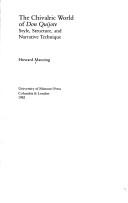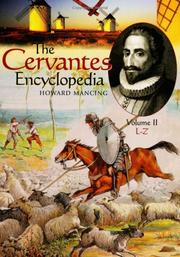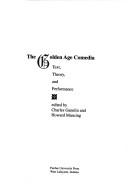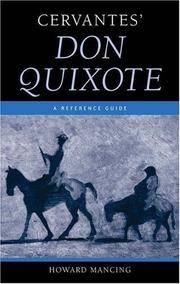| Listing 1 - 10 of 10 |
Sort by
|

ISBN: 0826203507 9780826203502 Year: 1982 Publisher: Columbia (Mo.): University of Missouri
Abstract | Keywords | Export | Availability | Bookmark
 Loading...
Loading...Choose an application
- Reference Manager
- EndNote
- RefWorks (Direct export to RefWorks)
Chivalry in literature --- Cervantes Saavedra, Miguel de, --- Technique --- Cervantes Saavedra, Miguel de --- -Technique --- Cerbantes Saavedra, Miguel de, --- Cervantes de Saavedra, Miguel de, --- Cervantes, M., --- Cervantes, Michael a, --- Cervantes, Miguel de, --- Cervantes Saavedra, Michael a, --- Cervantes Saavedra, Michiel de, --- Cervantes Savedra, Miguel, --- De Cervantes Saavedra, Miguel, --- Hsi-wan-ti-shih, --- Saavedra, Miguel de Cervantes, --- Sai-wan-tʻi-ssŭ, --- Savedra, Migelʹ Servantes, --- Savedra, Miguel Cervantes, --- Servantes, M., --- Servantes Saavedra, Migelʹ de, --- Servantes Saavedra, Miguėlʹ, --- Serṿantes Saṿaidrah, Miguʼel de, --- Servantes Savedra, Migelʹ, --- Servantesu, M., --- Sirfāntīs, --- Tservantes, Michaēl, --- Сервантес Сааведра, Мигель де, --- סערװאנטעס סאאװעדרא, מיגעל דע --- סערוואנטעס דע סאאוועדרא, מיגעל דע --- סרונתס סאוידרה, מיגואל די --- סרונטס סאאוידרא, מיגואל די, --- סרונטס סודרה, מיגל דה, --- סרונטס, מיגאל --- צערװאנטעס, מיגועל, --- ثربانتس سابدرا، ميجيل دي، --- سروانتس --- セルバンテス, --- 塞万提斯, --- Technique. --- De Cervantes, Miguel, --- Cervantes y Saavedra, Miguel de --- De Cervantes, Miguel --- Cervantes, Michel --- Cervantes Saavedra, Miguel de, - 1547-1616 - Don Quixote --- Cervantes Saavedra, Miguel de, - 1547-1616 - Technique --- Cervantes Saavedra, Miguel de, - 1547-1616

ISBN: 0313306958 Year: 2004 Publisher: Westport (Conn.): Greenwood
Abstract | Keywords | Export | Availability | Bookmark
 Loading...
Loading...Choose an application
- Reference Manager
- EndNote
- RefWorks (Direct export to RefWorks)

ISBN: 9781557530424 1557530424 Year: 1994 Publisher: West Lafayette, Ind.: Purdue university press,
Abstract | Keywords | Export | Availability | Bookmark
 Loading...
Loading...Choose an application
- Reference Manager
- EndNote
- RefWorks (Direct export to RefWorks)
Spanish drama --- Spanish drama --- Theater --- Theater
Book
ISBN: 1498582699 9781498582698 Year: 2018 Publisher: London Lexington Books
Abstract | Keywords | Export | Availability | Bookmark
 Loading...
Loading...Choose an application
- Reference Manager
- EndNote
- RefWorks (Direct export to RefWorks)

ISBN: 9780313333477 Year: 2006 Publisher: New York ; Westport ; London Greenwood Press
Abstract | Keywords | Export | Availability | Bookmark
 Loading...
Loading...Choose an application
- Reference Manager
- EndNote
- RefWorks (Direct export to RefWorks)
Book
ISBN: 3030890775 3030890783 Year: 2022 Publisher: Cham, Switzerland : Springer,
Abstract | Keywords | Export | Availability | Bookmark
 Loading...
Loading...Choose an application
- Reference Manager
- EndNote
- RefWorks (Direct export to RefWorks)
Book
ISBN: 1611488575 1611488583 1611488591 Year: 2017 Publisher: Lewisburg, [Pennsylvania] : Bucknell University Press,
Abstract | Keywords | Export | Availability | Bookmark
 Loading...
Loading...Choose an application
- Reference Manager
- EndNote
- RefWorks (Direct export to RefWorks)
This book is a unique scholarly attempt to examine Don Quixote from multiple angles to see how the re-accentuation of the world's greatest literary hero takes place in film, theater, and literature. To accomplish this task, eighteen scholars from the USA, Canada, Spain, and Great Britain have come together, and each of them has brought his/her unique perspective to the subject.
Digital
ISBN: 9783030890780 9783030890773 9783030890797 9783030890803 Year: 2022 Publisher: Cham Springer International Publishing, Imprint: Palgrave Macmillan
Abstract | Keywords | Export | Availability | Bookmark
 Loading...
Loading...Choose an application
- Reference Manager
- EndNote
- RefWorks (Direct export to RefWorks)
Restoring the Human Context to Literary and Performance Studies argues that much of contemporary literary theory is still predicated, at least implicitly, on outdated linguistic and psychological models such as post-structuralism, psychoanalysis, and behaviorism, which significantly contradict current dominant scientific views. By contrast, this monograph promotes an alternative paradigm for literary studies, namely Contextualism, and in so doing highlights the similarities and differences among the sometimes-conflicting contemporary cognitive approaches to literature and performance, arguing not in favor of one over the other but for Contextualism as their common ground. Howard Mancing, who has recently made the transition to Professor Emeritus of Spanish at Purdue University, USA, is a renowned expert on Cervantes and Early Modern Spanish Literature, as well as a pioneer in Cognitive Literary Studies. He has published two monographs: The Chivalric World of Don Quixote: Style, Structure, and Narrative (1982) and Miguel de Cervantes' 'Don Quixote': A Reference Guide (2006), and coedited three volumes of essay collections. In addition, he authored the two-volume Cervantes Encyclopedia in 2004. Howard has also written numerous journal articles and book chapters on Cognitive Studies topics such as embodied cognition, narrative and affect and Theory of Mind representations in literature. Jennifer Marston William is a Professor of German with specializations in twentieth and twenty-first century literature and film. She is currently serving as the Head of the School of Languages and Cultures at Purdue University, USA. Jennifer's second monograph, Cognitive Approaches to German Historical Film: Seeing is Not Believing, was published with Palgrave in 2017, and she has published scholarly articles and book chapters on conceptual metaphor and on literary analyses from the perspective of Theory of Mind. She is also a co-founder, with Howard Mancing, of the Center for Cognitive Literary Studies at Purdue, which has existed since 2008 and was recently renamed the Center for Neurohumanities.
Philosophy --- Cognitive psychology --- Theatrical science --- Linguistics --- Literature --- performances (kunst) --- geletterdheid --- theater --- filosofie --- literatuur --- cognitieve psychologie
Book
ISBN: 9781557535702 1557535701 9786613114686 1283114682 1612491995 9781612491998 9781612492001 1612492002 9781283114684 6613114685 Year: 2011 Publisher: West Lafayette (Ind.) Purdue University Press
Abstract | Keywords | Export | Availability | Bookmark
 Loading...
Loading...Choose an application
- Reference Manager
- EndNote
- RefWorks (Direct export to RefWorks)
Theory of Mind is what enables us to "put ourselves in another's shoes." It is mindreading, empathy, creative imagination of another's perspective: in short, it is simultaneously a highly sophisticated ability and a very basic necessity for human communication. Theory of Mind is central to such commercial endeavors as market research and product development, but it is also just as important in maintaining human relations over a cup of coffee. Not surprisingly, it is a critical tool in reading and understanding literature, which abounds with characters, situations, and "other people's shoes." Furthermore, it is becoming increasingly apparent that reading literature also hones these critical mindreading skills. Theory of Mind and Literature is a collection of nineteen essays by prominent scholars (linguists, cognitive scientists, and philosophers) working in the cutting-edge field of cognitive literary studies, which explores how we use Theory of Mind in reading and understanding literature.
Literature --- Philosophy of mind in literature. --- History and criticism --- Theory, etc. --- Philosophy of mind in literature --- Theory, etc --- E-books --- Literature History and criticism
Book
ISBN: 9783030890780 Year: 2022 Publisher: Cham Springer International Publishing :Imprint: Palgrave Macmillan
Abstract | Keywords | Export | Availability | Bookmark
 Loading...
Loading...Choose an application
- Reference Manager
- EndNote
- RefWorks (Direct export to RefWorks)
| Listing 1 - 10 of 10 |
Sort by
|

 Search
Search Feedback
Feedback About UniCat
About UniCat  Help
Help News
News